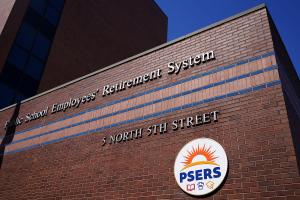Spotlight PA is an independent, nonpartisan newsroom powered by The Philadelphia Inquirer in partnership with PennLive/The Patriot-News, TribLIVE/Pittsburgh Tribune-Review, and WITF Public Media. Sign up for our free newsletters.
HARRISBURG — Members of the board of Pennsylvania’s $73 billion school pension fund won’t be required to sign non-disclosure agreements before hearing on Monday the long-awaited findings of an internal investigation into the mammoth plan.
The Public School Employees’ Retirement System is still asking the board to sign the secrecy pacts, but is not insisting upon it, the plan’s spokesperson says. Her statement clarified a previous controversial email from the board’s chairman, asking members to sign NDAs without saying they had the option to refuse.
A law firm is to unveil the results of its investigation at a closed-door session for the PSERS board on Monday morning. But the board has yet to decide whether, how soon, and how completely those findings will be made public after the meeting.
The firm, Womble Bond Dickinson, was hired 10 months ago to conduct a parallel probe into issues that have also been the subject of investigations by federal prosecutors, the FBI, and federal financial regulators. The inquiries have been looking into the fund’s adoption of an exaggerated number for investment profits as well as PSERS’ purchase of real estate near its Harrisburg offices. The board later corrected the profits figure, forcing school staff to pay more to the pension fund, but has otherwise said nothing for months about any issue.
Womble lawyers said at one point that they could deliver their report on Nov. 18. But the board leaders grew skittish about receiving it, setting and resetting dates to do so, after the law firm warned in early November that PSERS officials who are criticized in the report have strong legal rights to defend their reputations. At one point, a top Womble lawyer cautioned the board that transparency might not be “the right answer.”
Board member Katie Muth, a Democratic state senator from Montgomery County, has sharply criticized the call for NDAs and said she would not sign one. “I’m not signing because it’s unnecessary and redundant since the executive session is already confidential,” she said. Her lawyer, Terry Mutchler, said it was “the right move” not to require them.
“I’m glad to hear they clarified this,” Mutchler said. “Half the battle is getting the public to believe what you’re saying is true and accurate.”

The agency had “indicated last week that the price of admission to attend a significant closed-door session was to be signing a non-disclosure agreement,” added Mutchler, a former head of Pennsylvania’s state Office of Open Records. “We’re very happy they have now stated that the NDA is not a requirement.”
Another board member, State Treasurer Stacy Garrity, will not sign any NDA, according to Samantha Galvez, the treasurer’s spokesperson.
Garrity and Muth have called for the agency to make a prompt public report of the investigation findings. So have Gov. Tom Wolf and Democratic and Republican candidates intent on succeeding him.
Paula Knudsen Burke, a lawyer with the national Reporters Committee for Freedom of the Press, said that the report should be released widely and not censored.
“There must be a balancing that weighs the public’s interest in disclosure against employees’ claimed reputational concerns,” she said. “Given the massive amounts of public dollars involved in PSERS’ operations, the scales weigh heavily in favor of transparency.”
Burke, who has sought PSERS records on behalf of The Inquirer, added: When taxpayers help pay for a report of a “public institution … they are entitled to see how their money is spent.”
How the Womble report might be disclosed
PSERS is financed by working educators, taxpayers, and investment returns. The fund sends $6 billion in pension checks to 250,000 retirees yearly.
While Womble has so far revealed little of its work to the board, sources say the firm has told the panel that it has found no evidence of criminal wrongdoing by PSERS staff — points echoed by lawyers for executive director Glen Grell and former chief investment officer James H. Grossman Jr.
Grell and Grossman announced their retirement in November in a shakeup of fund leadership.
“Based on my extensive review of the facts, I know that Mr. Grell has not engaged in any criminal conduct,” wrote his lawyer, Marc S. Raspanti. “Furthermore, our client has not engaged in any action that would or could form the basis of any civil liability.”
Of Grossman, his lawyer Matthew Haverstick has said, “As an employee of the organization, he did what he was told to do and didn’t do anything wrong.”
Haverstick could not be reached for comment Wednesday. He has praised the call for NDAs, saying they would protect the reputations of staff and prevent the board from “being unfairly criticized.”
In response to a query from The Inquirer, Evelyn Williams, PSERS’ spokesperson, wrote Tuesday that “PSERS board members have been asked to sign an NDA but are not required to sign it to attend the January 31st meeting.” The emphasis was hers.
Williams, in her statement, left the question of public disclosure unresolved: She wrote only that, during the meeting, “the board will determine the appropriate next steps.”
Other critical reports have gone public with rebuttals
In a key 1996 ruling, Simon v. Commonwealth of Pennsylvania, Commonwealth Court blocked a state crime commission from identifying people as being linked to mobsters without giving them the right to defend themselves in advance. Christopher Santa Maria, the PSERS board chair, cited the decision in his original email to members, asking them to sign secrecy oaths.
As the ruling noted, the Pennsylvania Constitution enumerates reputation as a fundamental right. It is one of few state constitutions to do so.
Still, state officials have previously found ways to make explosive investigative reports public while looking out for the interests of those identified in the reports.
In 2014, then-Attorney General Kathleen Kane released a lengthy report exploring whether prosecutors had made missteps in the investigation of child molester Jerry Sandusky. The report includes written responses from 13 former prosecutors and others whose actions were explored in the probe.
In 2018, about a dozen priests who were among hundreds to be identified and criticized in a massive report by Attorney General Josh Shapiro about child abuse in six Catholic dioceses filed legal challenges to the document before its release.
The state Supreme Court backed the priests. In the end, Shapiro released an 884-page report that drew headlines. However, it had many sections blacked out, including the names of the priests who had questioned the report. It also included a further 400 pages of rebuttals from those it criticized.
In an opinion, the high court acknowledged that the censorship might be “unsatisfying to the public and to the victims,” but said that fairness demanded the redactions.
WHILE YOU’RE HERE… If you learned something from this story, pay it forward and become a member of Spotlight PA so someone else can in the future at spotlightpa.org/donate. Spotlight PA is funded by foundations and readers like you who are committed to accountability journalism that gets results.
